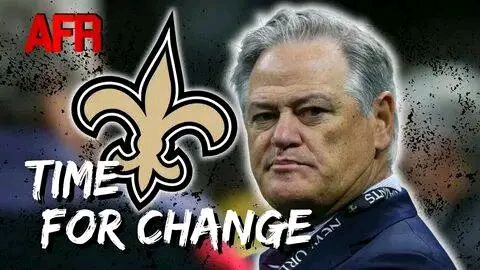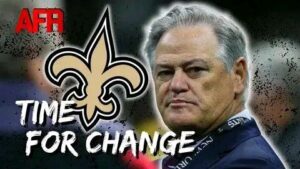
BREAKING: Saints Urged to Follow Jaguars’ Lead and Dismiss GM Mickey Loomis After Recent Decline

In light of recent developments within the NFL, the New Orleans Saints find themselves at a crossroads. Following the Jacksonville Jaguars’ surprising decision to part ways with general manager Trent Baalke, calls are increasingly directed toward the Saints to consider a similar action against their longtime executive, Mickey Loomis. With the team struggling to find consistency on the field in recent seasons, many analysts and fans are questioning whether Loomis is the right person to lead the franchise into the future.
Trent Baalke’s firing from the Jaguars was not a decision made lightly. His tenure was marked by a mix of successes and setbacks, but ultimately, the team’s poor performance and internal issues resulted in a clean slate being sought by the team’s ownership. Just two years into Baalke’s leadership, the Jaguars opted for a drastic shift after a series of missteps in personnel decisions and lackluster seasons. The ripple effects of this decision are echoing throughout the league, prompting the Saints to reevaluate their own front-office structure.
Mickey Loomis has been at the helm of the Saints since 2002, a tenure during which he has achieved considerable success. He played a pivotal role in orchestrating the team’s Super Bowl victory in the 2009 season, and his ability to make strategic moves in the NFL Draft and free agency has often been commended. However, in more recent years, fans have grown increasingly restless, as the Saints have struggled to adapt to changes in player personnel and have been plagued by inconsistent performances on the field.
Loomis’ management strategies have come under scrutiny, especially regarding the quarterback position. The Saints have cycled through a number of signal-callers since the retirement of future Hall of Famer Drew Brees, and the franchise has yet to establish a reliable long-term solution. While some believe Loomis is relying too heavily on free-agent acquisitions and aging veterans, others argue that he has not done enough to develop homegrown talent, particularly at a time when the team is facing a generational shift.
In addition to the challenges at quarterback, the Saints have been hampered by a series of injuries that have affected their ability to maintain a competitive roster. This situation has fueled discussions about their depth and the effectiveness of their scouting department. The inability to adequately fill gaps left by injured players indicates potential shortcomings in player evaluation and recruitment strategies. While injuries are part and parcel of the NFL, the Saints’ struggles have highlighted a deeper issue within the organization.
Moreover, reports suggest rising discontent within the Saints’ locker room, with players voicing frustrations about strategic decisions and the front office’s handling of various situations. This type of dissent can be indicative of larger organizational issues, which might require an overhaul to resolve. Tensions between Loomis and coaching staff members have also been reported, contributing to an environment that may hinder a cohesive effort to turn the team around.
The Saints’ ownership, led by Gayle Benson, has historically supported Loomis. However, loyalty can only extend so far, especially when results on the field fail to reflect the expectations of a franchise with a proud history and passionate fanbase. Should the team’s struggles persist, it may lead to uncomfortable discussions regarding Loomis’s future with the organization.
In a league defined by competitiveness and the relentless pursuit of excellence, franchises that fail to make necessary adjustments can quickly fall out of favor. The Jaguars’ decision to shift their front office illustrates a growing trend in the NFL—teams are willing to make bold moves in hopes of revitalizing their prospects. The Saints, too, may need to confront this reality if they hope to restore their status as playoff contenders in the NFC.
As the situation unfolds, it remains to be seen whether the Saints will take the plunge and initiate a change in leadership. Nonetheless, Loomis’s current position is increasingly scrutinized, and if a decision is made to let him go, it could profoundly alter the trajectory of the franchise. The calls for his dismissal serve as a reminder of the intense pressure that comes with leadership in a high-stakes environment like the NFL, where fans are eager for a path toward success. The season ahead will be critical in determining whether Loomis can pivot the team towards a brighter future or whether the Saints will join the ranks of franchises seeking new leadership and direction.





